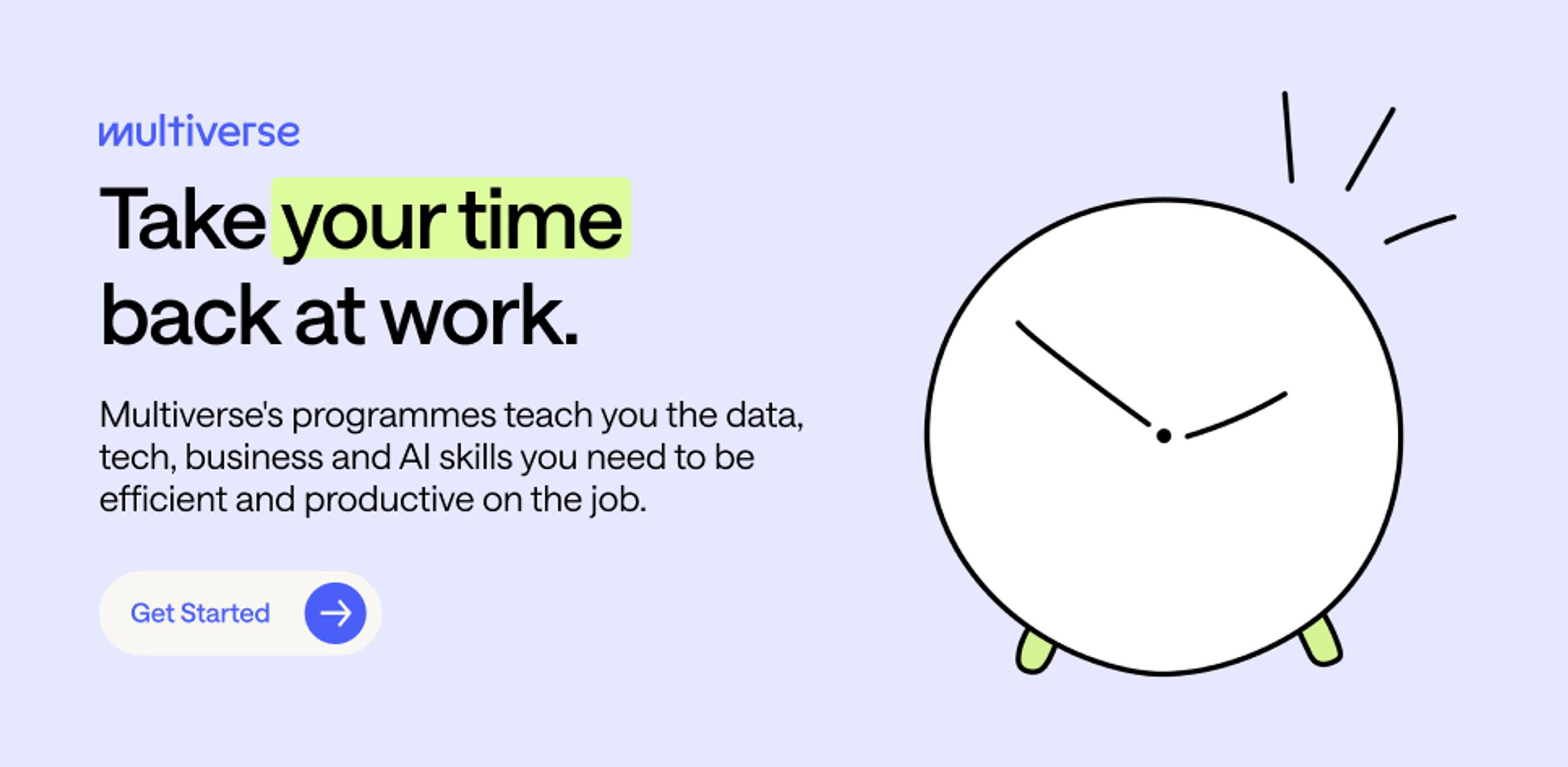Contents
Artificial intelligence (AI) and machine learning (ML) have become two of the hottest buzzwords in the tech industry. But what are the differences between AI vs machine learning?
Artificial intelligence and machine learning are distinct but related concepts. AI refers to advanced software that imitates how humans process and analyse information. Machine learning is a subtype of AI that uses algorithms–or sets of rules–to perform specific tasks.
These technologies have many innovative uses in finance, healthcare, logistics, and other industries. But the number of people with artificial intelligence and machine learning skills has not kept up with soaring demand. A 2024 Red Hat survey(opens new window) found that 81% of UK Information Technology Managers see a critical AI skills gap, with 40% citing talent shortages as their main obstacle preventing their organisations from using AI to its full potential.
Expanding your AI and machine learning skills can help you keep up with the evolving tech landscape. We examine the differences between these technologies, applications in the workforce, and more.
What’s the difference between AI and Machine Learning?
Artificial intelligence is a broad term for software that mimics how humans perform complex mental processes. This technology analyses information, learns from its experiences, and solves problems.
Machine learning is one of the most popular branches of AI. This approach uses algorithms — or instructions — to guide decision-making and execute tasks. All machine learning is AI, but not all AI programmes use machine learning.
Businesses often use artificial intelligence without machine learning for repetitive or straightforward tasks. Some people call these applications “Good Old-Fashioned Artificial Intelligence(opens new window)” (GOFAI) because they don’t learn from data like machine learning algorithms. For example, GOFAI chatbots use rule-based systems to respond to customer inquiries. These chatbots provide pre-scripted answers but can’t learn from previous interactions or adapt to different contexts.
However, some organisations create hybrid systems by combining machine learning with symbolic — or rules-based — AI. These models rely on machine learning algorithms to process data, but they also use symbolic reasoning techniques to interpret information based on predefined knowledge.
This dual approach allows hybrid AI systems to mimic human reasoning and solve more complex problems. For example, Google DeepMind(opens new window) has developed geometry-solving software that blends neural networks with a symbolic AI engine. The neural networks use their “intuition” to guess the best way to solve a geometry problem, while the symbolic AI engine generates solutions based on this reasoning.
What is AI?
Artificial intelligence refers to machines and software that imitate human cognitive functions. This technology performs advanced processes that traditionally relied on human intelligence. For example, AI software can identify patterns in large datasets, recognize faces in photographs, and give personalised recommendations.
Businesses use advanced computer systems and infrastructure to build AI applications. On the hardware front, Graphics Processing Units (GPUs) and Tensor Processing Units (TPUs) enable machine learning models to process large amounts of data efficiently. GPUs have powerful parallel processing capabilities, perfect for analysing images and videos. By contrast, TPUs perform complex computations at lightning speed, allowing neural networks to learn faster.
Additionally, many organisations use cloud computing to optimise their AI software. Cloud platforms like Google Cloud enable businesses to draw on remote training data for machine learning models without investing in expensive infrastructure. Users can also access additional resources — such as cloud storage solutions and analytics tools — to improve their AI operations. This flexibility lets businesses scale their AI applications up or down as needed, boosting performance and reducing costs.
Popular AI business applications
One of the most popular types of AI are large language models (LLMS). Engineers use vast quantities of human-generated content to train OpenAI’s ChatGPT and other LLMs. The models learn context and language from the data and use this knowledge to respond to human input.
Engineers also use AI to create robots that respond to their environments and perform intricate tasks. For instance, AI-powered vacuum cleaners avoid obstacles in their paths, while AI surgical robots assist surgeons with operations.
Additionally, AI enables researchers to develop autonomous systems that operate without human guidance. Autonomous drones and vehicles use algorithms and sensor technologies to make real-time decisions and navigate their environment.
Smart assistants have also gained widespread popularity. Applications like Siri and Google Assistant use natural language processing to interpret and respond to human input. Users can ask these assistants to perform many functions, such as adding tasks to their calendars, controlling smart devices, and setting timers.
Finally, retailers and streaming services often use AI-powered recommendation engines to personalise the customer experience. For example, Amazon(opens new window) uses machine learning algorithms to analyse customers’ browsing behaviour and suggest relevant products. The retailer also uses an LLM to tailor product descriptions for individual consumers.
What is Machine Learning?
Machine learning is a subset of AI that uses algorithms to create intelligent systems that learn from datasets. The algorithms detect patterns in data, make predictions based on historical trends, and complete tasks. They refine their performance over time as they receive more data, so humans don’t need to tweak the programming.
There are three main types of machine learning with different applications:
Supervised learning
An algorithm processes datasets with historical inputs and outputs and identifies their relationships. The software generalises and extrapolates this knowledge to predict future outputs. Organisations use supervised learning to teach algorithms to classify items, detect abnormal data points, and forecast future trends.
Unsupervised learning
The algorithm looks for connections and patterns between unlabeled data points and generates insights into the dataset’s structure. For instance, an algorithm could analyse website traffic and sort customers into groups based on browsing behaviour.
Reinforcement learning
The algorithm gains positive or negative reinforcement from its environment and adjusts its behaviour accordingly. AI-powered robots and self-driving cars use reinforcement learning to learn new tasks and optimise performance. The streaming service Spotify also uses reinforcement learning to provide increasingly accurate personalised recommendations.
The role of Deep Learning in AI and Machine Learning
Deep learning is a specialised field within machine learning that uses many layers of neural networks for sophisticated pattern recognition and problem solving. It’s designed to mimic how the human brain processes information, learns from experience, and applies reasoning.
Traditional machine learning algorithms rely heavily on human intervention to learn and often struggle to process unstructured data efficiently. In contrast, deep learning models can interpret many data types and automatically improve their performance with minimal human input.
Deep learning has a wide range of applications across various industries, including automotive, aerospace, healthcare, and security. For example, autonomous vehicles use deep learning to automatically detect and avoid obstacles in the road. Similarly, computer vision programmes use deep learning to recognize faces and classify images.
Machine Learning and AI: How do businesses use them?
Organisations in all industries leverage AI and machine learning to improve their operations. These technologies complete repetitive tasks faster and more accurately than humans, enhancing productivity. Businesses also use AI and machine learning to drive innovation and develop more efficient processes.
To develop and use AI applications effectively, professionals need diverse tech skills. For example, Marketers should be proficient in prompt engineering to effectively use generative AI tools to develop personalised marketing campaigns. Meanwhile, strong data analysis skills enable Supply Chain Managers to use AI for demand forecasting and inventory optimisation.
Here are five use cases for AI and machine learning in different sectors.
Autonomous threat detection
Cybersecurity professionals use AI and machine learning to detect cyber threats more efficiently. This technology autonomously monitors computer networks and systems for abnormal behaviour and data points. Algorithms analyse these anomalies to determine if they’re caused by cyber attacks and trigger defence mechanisms.
Autonomous threat detection lets organisations respond more quickly to cybersecurity incidents. For example, Horizon3.ai’s NodeZero Autonomous Security Platform(opens new window) detects attackers and automatically diverts them to decoy systems, preventing them from accessing critical data. The platform also improves and adapts in response to emerging threats so organisations can stay two steps ahead of cybercriminals.
Diagnostic imaging
AI and machine learning have revolutionised medical imaging(opens new window). Radiologists and other healthcare professionals use this technology to capture and reconstruct diagnostic images. For example, AI software can create synthetic images based on a single image, so patients spend less time in the radiology department.
AI also helps clinicians analyse images for lesions, tumours, brain aneurysms, and other conditions. In some cases, this technology may detect abnormalities missed by human eyes. This increased precision leads to faster and more accurate diagnoses and improves patient outcomes.
Personalised marketing campaigns
Marketers use artificial intelligence and machine learning to create more effective and targeted marketing campaigns. Machine learning algorithms analyse behaviour, demographics, and other data to gain insights into customers’ preferences. Companies use these findings to provide personalised product recommendations and promotions.
For example, Brewdog(opens new window) uses AI software to personalise its email marketing campaigns based on customers’ recent purchases, web activity, and other data. In a recent experiment, the company found that its personalised campaigns generated 13.8% more revenue than non-personalized ones.
Businesses also use AI to automate time-consuming marketing processes. AI-powered chatbots answer questions from prospective customers, while generative AI tools create articles and other marketing content. These innovations let marketers focus on tasks that require a human touch, like nurturing client relationships and developing the perfect brand voice.
Supply chain optimization
Products often travel through convoluted global supply chains before they reach customers. AI helps organisations streamline and optimise these processes so goods reach their destinations as efficiently as possible.
Sophisticated machine learning algorithms analyse historical data and forecast future trends. These models predict changes in customer demand, the availability of raw materials, and other market dynamics. Businesses leverage this data to anticipate supply chain fluctuations and respond proactively. For example, Unilever(opens new window) uses an AI application called Scoutbee to scrape web data to find alternative suppliers if demand for a product spikes or their usual distributors aren’t able to meet inventory needs.
Fraud detection
Any organisation can fall victim to internal and external fraud. AI fraud detection tools use machine learning algorithms to analyse data and identify suspicious or anomalous patterns. These applications also generate detailed reports that help humans investigate potentially fraudulent activity.
For instance, the UK government developed the Single Network Analytics Platform (SNAP)(opens new window) to detect fraud and organised crime. This AI system analyses data from the World Bank and other sources to detect suspicious activity and networks. With this tool, public sector organisations can effectively detect fraudulent claims and safeguard public funds from criminals.
Ethics in AI and Machine Learning: What professionals need to know
According to Multiverse’s ROI of AI report, 93% of professionals are confident that they use artificial intelligence ethically. However, despite this optimism, researchers and tech experts have raised alarms about the ethical dilemmas associated with this technology.
Bias is one of the most significant ethical challenges posed by AI. Models trained on biased datasets can perpetuate racism, sexism, and other forms of discrimination. For instance, an UberEats courier(opens new window) recently won a lawsuit after the company’s “racially discriminatory” facial recognition system barred him from accessing the platform. This case illustrates how AI systems that make automated decisions based on physical appearance can reinforce inequities.
Data privacy is another pressing concern. Many people worry that artificial intelligence tools collect and use their personal data and intellectual property without consent. In 2024, for example, the UK Information Commissioner’s Office revealed that LinkedIn(opens new window) had been training its AI models with user data without explicit consent. In response to these findings, the social media platform agreed to suspend this training until further notice.
Ethical frameworks can guide professionals as they develop and use AI and machine learning tools. For example, the UK government(opens new window) has created a seven-point framework to help civil servants use this technology responsibly. This blueprint promotes data integrity, fairness, transparency, and other key principles.
Demand for AI and Machine Learning jobs
The widespread adoption of AI and machine learning has opened new career opportunities in every industry. The World Economic Forum’s Global Risk Report 2024(opens new window) predicts that the demand for AI and Machine Learning Specialists will increase by 40% by 2027.
Data science is one of the fastest-growing AI-related professions. Data Scientists use machine learning algorithms to interpret complex datasets and help business leaders make informed decisions.
Data Analysts and scientists rank sixth on the Future of Jobs Report 2023(opens new window)’s list of the fastest-growing occupations between 2023 and 2027. These professionals also command healthy salaries. Glassdoor data indicates Data Scientists in London earn a median salary of £60,000(opens new window).
Additionally, LinkedIn’s 2024 Jobs on the Rise Report(opens new window) lists Artificial Intelligence Engineer as the tenth-fastest growing career. These experts use programming languages and technical skills to build, train, and maintain AI software. According to Glassdoor, Artificial Intelligence Engineers in London earn an average salary of £64,000(opens new window).
Multiverse’s upskilling programmes can help you gain the essential skills to thrive in the evolving job market and pursue AI-related roles. Our AI for Business Value programme teaches you how to implement AI solutions to boost operational efficiency and drive organisational change. Similarly, the AI-Powered Productivity programme focuses on AI literacy, empowering you to use AI solutions to improve efficiency.
These programmes are fully funded by your employer and allow you to gain hands-on experience in your current role. You’ll get at least three hours of protected learning time weekly to complete structured training modules and collaborative projects. You’ll also practise applying your new AI and ML skills in the workplace, accelerating your professional development.
Future proof your career with in-demand skills
AI will disrupt approximately 40% of jobs worldwide, according to a 2024 report by the IMF(opens new window). This statistic may sound alarming, but this technology will likely change most jobs, not eliminate them. Developing AI and machine learning skills will allow you to adapt to the evolving workforce and fill critical skills gaps.
Immerse yourself in the latest AI and machine learning developments with Multiverse’s free bite-sized AI training(opens new window). These innovative training modules provide fast, actioned-oriented lessons on foundational AI principles, prompt engineering and teach you how to apply AI ethically in your current career.
Ready to become an AI expert? Talk to your employer about our AI for Business Value apprenticeship to start your journey.







